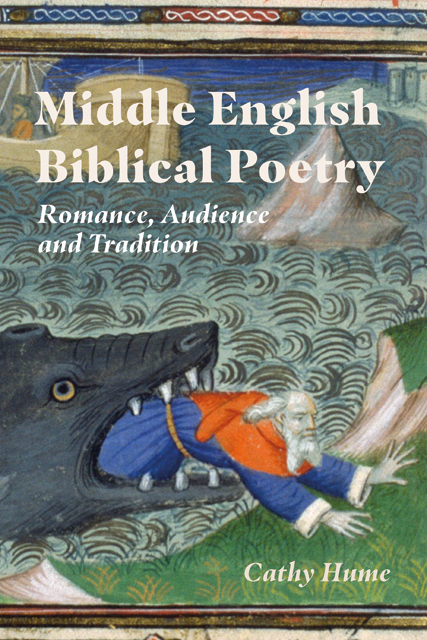Book contents
- Frontmatter
- Dedication
- Contents
- List of illustrations
- Acknowledgements
- List of abbreviations
- Note on translations
- Introduction
- 1 Iacob and Iosep: a happy tale of a knightly family
- 2 Two lives of Adam and Eve: exemplarity after the Fall
- 3 A Pistel of Susan: beauty in a Babylonian garden
- 4 Patience: anti-romance
- 5 Cleanness: household virtues, familiar sins
- Conclusion
- Bibliography
- Index of manuscripts
- General index
3 - A Pistel of Susan: beauty in a Babylonian garden
Published online by Cambridge University Press: 04 January 2024
- Frontmatter
- Dedication
- Contents
- List of illustrations
- Acknowledgements
- List of abbreviations
- Note on translations
- Introduction
- 1 Iacob and Iosep: a happy tale of a knightly family
- 2 Two lives of Adam and Eve: exemplarity after the Fall
- 3 A Pistel of Susan: beauty in a Babylonian garden
- 4 Patience: anti-romance
- 5 Cleanness: household virtues, familiar sins
- Conclusion
- Bibliography
- Index of manuscripts
- General index
Summary
A Pistel of Susan seems to have been a popular text in medieval England. Alone among the poems in this book, it appears in multiple well-thumbed manuscripts from across the country. The Pistel, an alliterative poem written in thirteen-line bob and wheel stanzas, was probably written in the second half of the fourteenth century in southern Yorkshire, perhaps by the mysterious ‘Huchon’. It is included in the Vernon and Simeon manuscripts, celebrated and enormous religious compendia from c. 1400, perhaps commissioned by a wealthy aristocrat and copied in Worcestershire. But it was also copied into manuscripts that combine religious content with more secular reading: romances and travel narratives. The Pistel is the first item in British Library Cotton Caligula A ii, copied c. 1450. This important manuscript, possibly copied in the central Midlands, anthologises many Middle English romances as well as religious and didactic pieces. In the more modest Huntington Library MS HM 114, copied in London between 1421 and 1437, the Pistel appears alongside Mandeville’s Travels, Troilus and Criseyde and Piers Plowman. Pierpont Morgan MS M 818 (also known as the Ingilby manuscript) is another unshowy manuscript, this time copied probably in Lincolnshire in the middle of the fifteenth century. There, the Pistel is followed by Richard Rolle’s Form of Living and the earliest known A-text of Piers Plowman. It has even been claimed that Chaucer knew the poem, though, as I will show, the evidence for this is not persuasive. The manuscripts suggest a cultural world that brings together English vernacular romance and mainstream religious practice, and an audience that extended beyond the aristocratic world to people further down the social scale. As we will see, the poem’s content bears this out.
The Pistel retells the story of Susanna from chapter 13 of the Book of Daniel. The events narrated take place during the exile of the Jews in Babylon. Two Jewish elders develop a lecherous desire for Susanna, the beautiful wife of the rich Joachim, whom they have seen walking in the garden of her marital home, and entrap her there. When they catch her alone, preparing for a bath, they proposition her and tell her that, if she refuses to consent to adulterous sex with them, they will say that they have caught her with another man.
- Type
- Chapter
- Information
- Middle English Biblical PoetryRomance, Audience and Tradition, pp. 93 - 118Publisher: Boydell & BrewerPrint publication year: 2021



